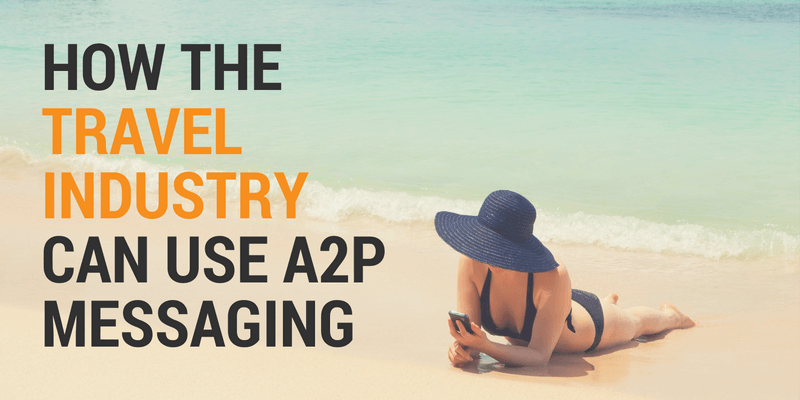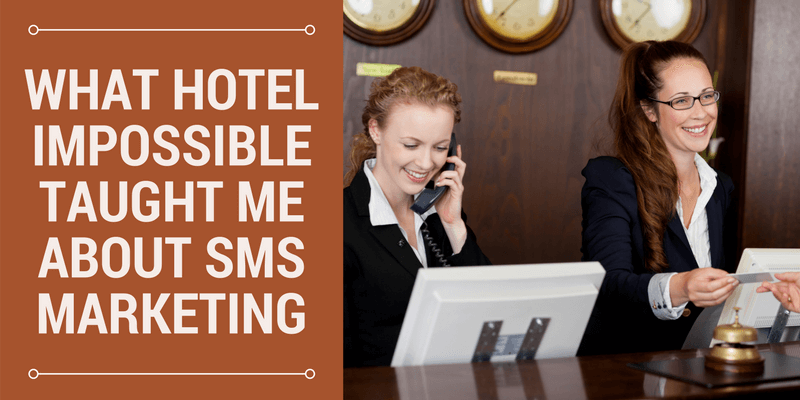How the Travel Industry can use A2P Messaging

A few months ago, I wrote a blog about travel agents using SMS messaging to respond to changes in travel due to world events. It turns out that the travel industry can also benefit from the fastest growing SMS sector: Application to Person (A2P) messaging.
According to a recent report from Research and Markets, the “Rapid increase in the growth of mobile phone subscribers coupled with increasing mobile marketing activities is driving the global A2P SMS market.” They predict that the market will grow to $62.1B (~£50B) by 2025.
The travel industry accounts for some portion of that, but not very much currently. Another report by the Mobile Ecosystem Forum found that only 10% of consumers had received or sent SMS messages from companies about their travel.
That means there is plenty of room to grow for the industry. The use of mobile devices isn’t going to slow down anytime soon, and travellers will begin to expect the convenience of SMS messaging (if they haven’t already). A2P can make it easier for travel agents and companies to contact their travellers. Here are some examples.
Last Minute Sales
There are almost always rooms that haven’t been filled, empty seats on planes and trains, or cabins on cruises. While travel agents can certainly call their most active clients to offer last minute deals, that takes time. With A2P messaging, a message with a great last minute deal could be sent automatically out to those customers. This would let the agent contact more people than they could using voice calls, and probably get a higher – and quicker – response than using email.
Reservation Information
One of the most common uses of A2P messaging is booking confirmations. But there are other uses as well.
Last minute schedule changes, flight delays, transfer information or even hotel changes can also be sent automatically. These types of alerts need to reach the client fast so they can prepare or make the necessary changes quickly. SMS messaging is guaranteed to arrive within seconds. It also is preferable to email because internet access is not required.
While this sort of service via SMS isn’t standard yet, mobile based customers will likely see it as a differentiator when choosing a travel agent or booking site. It’s just more convenient for them.
Customer Service
While some travellers are out just looking for a good deal, most want to experience the best customer service during their trip. Providing up-to-date information on itinerary changes is a valuable service. But you can go beyond that too.
Providing weather updates, especially if there are unexpected forecasts for the climate, could be incredibly helpful to travellers. Sending links or information on the local fare or activities might be just what someone needs to decide on what to do that day.
Giving clients the ability to complain or compliment about their stay via SMS will give important feedback about the destinations, activities, and their preferences. Follow-up surveys after they return home give an additional opportunity to provide even better service in the future.
Some of these things are probably already being done via email or voice calls. But using SMS has advantages. The largest of these is the immediacy that no other channel can provide. It is also a very personal channel, allowing you to provide great service – automatically via A2P – to clients who will remember it the next time they book a trip.
To find out more about how SMS and A2P can help the travel industry, download our special report, How to Use SMS Messaging for Marketing, Booking and Customer Support. You can also ask our experts questions via live chat, email or by phone.
Related Articles
5 Ways Hotels Can Use SMS Marketing to Increase Brand Loyalty
More and more industries are tuning in to the advantages that SMS marketing can offer their business. SMS marketing is not only useful for acquiring new customers, it can be used to increase brand loyalty as well. This is particularly true for the hospitality industry, which faces challenges unique from other industries, in that they are on the front line when it comes to delivering customer service.
Hоw Cоасh Tоur Companies Can Use SMS Mаrkеtіng
How The Tourism Industry can use SMS Marketing
Today we’re bringing our technology with us on our travels - using our smartphones to create a more personalised experience, one that points us towards tailor-made itineraries. This means those who promote certain sectors of the travel industry are in a strong position to have their SMS marketing campaigns favourably received.
SMS Marketing: Four Sectors Successfully Using Text Messaging
SMS marketing has seen a huge uplift in popularity in recent years, with big brands investing in the technology to better engage with their customers. There are so many benefits of SMS marketing, from the ability to directly to reach customers with your communications, to the fact that over 80% of SMS texts are read. With over approximately 90% of the world receiving mobile coverage, you’re highly likely to be able to reach your audience, regardless of where they are. SMS marketing is cost effective, and campaigns are quick to develop, in as short a time period as the time it takes to write a text message. This gives you the advantage of being able to communicate quickly, and effectively with customers, reacting to information almost instantaneously. With so many reasons to use SMS marketing, we’ve highlighted four sectors successfully using SMS messaging as case studies to highlight the advantages of investing in the technology.
How Campsites Can Use SMS Messaging to Get New Business
The campervan and caravan industry grew 16% this past year. Campsite and holiday park owners can connect with the thousands of new travellers using SMS messaging. After all, 76% of travellers prefer to take their mobile on holiday rather than a friend.
Enhancing Two-Way SMS Messaging with Autoresponders
SMS messaging can be a one-way, or a two-way affair. Sending coupons, sale notifications, or event announcements are all one-way messaging. The recipient doesn’t need to reply in order to use the information sent. In two-way messaging though, recipients can reply to your messages. And that makes it much more interesting, engaging, and potentially a lot more work to manage.
Building an SMS Inbound Marketing Campaign for Your Hotel Business
SMS flies under many marketers radars when it comes to building an inbound marketing strategy. But if Buzzfeed's news app is to be believed, there are days when SMS generates the greatest percentage of shares on that channel, beating out Twitter, Facebook, WhatsApp and email. SMS share buttons are reported to have been used 4 times more than Twitter buttons. When you consider Twitter has 317 million active users, then SMS marketing has huge potential for a hotel business.
Personalising Your SMS Marketing
Using people’s names in marketing is great. It does provide a certain level of personalisation that can get people more interested in what you’re sending them. Of course in text messaging, you don’t always have the room for a name, your message, and the required opt out information … usually there just isn’t enough room. So how can you make your marketing messages personal?
SMS Marketing for Car Hire Companies
What Hotel Impossible Taught Me about SMS Marketing
In Hotel Impossible, Anthony Melchiorri saves struggling hotels. It turns out some of the advice he gives them could make you a lot more money. It’s all about marketing and knowing where to get the best ROI. Read the blog to see if you’re spending in the right places.












